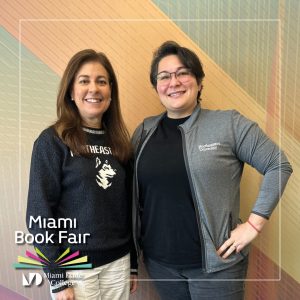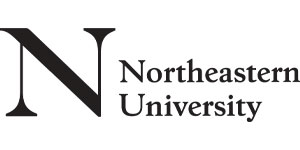
Lifelong Miamian Maria Alonso is the CEO and regional dean of Northeastern University Miami. Natalie Grillo, born and raised in the Magic City, is a graduate student at the school’s Khoury College of Computer Science, where she’s pursuing a master’s degree in the Align program.

What compelled Northeastern to support Miami Book Fair?
MA: I think first and foremost we saw Book Fair as a way to support Miami Dade College, who we’ve been working with since announcing our campus early last year. And I personally have been involved with the college – I was a part of the foundation’s board and I know that MDC serves as an anchor organization in our community. Secondly, it’s Northeastern’s goal to be an intrinsic part of the Miami community. When our campus is completed this summer, our plan is to make it available as a resource for all. We’ll host organizations and welcome the community in, be that through fireside chats or panels, pitch competitions, entrepreneurial opportunities, and more. Very similar to what MDC does today. We want Northeastern to be a convening place where people can feel comfortable and explore, a place not just for students but for the community. We felt that is exactly what Miami Book Fair is all about, and that [a partnership] would be a tremendous fit.
Northeastern had a robust presence at Book Fair 2023. You had a booth at Street Fair and sponsored author sessions for Walter Mosley; Sarafina El-Badry Nance and Elio Morillo; Shane Neman, Michael Sayman, and Lisa Carmen Wang; Andrew Otazo and Mario Alejandro Ariza; and Carl Hiaasen. What led you to choose those particular programs?
MA: We were honored to be able to support these authors, but it was quite a task to select the ones that we did given the breadth and incredible talent that the Fair always features. I’d say that we were looking for authors with wide appeal – especially local authors – and who had stories that were inspiring or that resonated with Miami. Overcoming obstacles, triumphs, immigrants. Stories that are reflective of our own Miami story.
Walter Mosley has over 60 books under his belt, he has wide appeal; that was an easy choice. Andrew Otazo and Carl Hiaasen, they’re local authors and the latter had such an incredible career at the Miami Herald and now as an author. You know, their stories make people smile and we wanted to be a part of that. And then we felt that a conversation about space, with Sarafina and Elio, that was just amazing. Elio, an immigrant, overcame so many obstacles and now is a leading voice in tech, AI, robotics. And Sarafina overcame obstacles to become a very successful astrophysicist, an area where there’s not a lot of leading women, so that was also important to us.
Our campus is going to be focused largely on STEM degrees that have a close fit to industry needs, that are tied to the future economy, and that provide pathways to economic mobility and empowerment. An example of that would be the Khoury College of Computer Science and the Align program that Natalie is a part of. Align is meant for students who don’t have a tech background, who completed undergraduate degrees in anything else but technology or computer science. It’s meant for people who want to pivot and be a part of this tech movement. We’re very proud of the fact that in just 10 years [of this program], we’ve had over 150 undergraduate degrees that are represented in our alumni base, and that 54% of all of the program’s graduates are women – almost double the national average.
That’s great!
MA: Yes, and not only do we over index in women, we also over index in what is traditionally underrepresented ethnic and racial representation in tech – three and a half times the national average. This program is really helping us change the face, literally, of technology. I have a perfect example of that sitting right next to me in Natalie. Her background isn’t in tech and now she’s here in her second semester. I’m so proud that she’s a Miamian, she’s a woman, and she’s helping us make that change real, right here.
NG: All of those numbers that Maria shared are very much reflected in our cohort, as well as in the staff, faculty, and advisers. It’s really amazing to be a part of such a diverse group that’s doing something as meaningful and important as changing the landscape of technology and making it accessible to folks who thought it was out of their reach.
A handful of Northeastern students were selected to introduce some of the sponsored authors, Natalie among them. Tell me what that experience was like for you.
NG: I introduced Sarafina and Elio for the “Celestial Bodies” session; I gave an enthusiastic “yes!” when I was asked to do it. Given the themes and the underrepresented voices of these two authors, the session really resonated with me and was so inspiring. I really connected with their stories; both of their books are incredible.
Feedback from the authors was so positive – they were extremely taken with your energy and engagement. Were you able to get some one-on-one time with either of them afterward?
NG: Yes, absolutely. I got some words of wisdom from both of them on something that’s very common when making such a huge career shift and with being in STEM – and that I’m experiencing firsthand – which is imposter syndrome. They were great at assuring me that [underrepresented] voices are valued and very much have a seat at the table.
How does MBF’s work align with your personal thoughts on access to literary culture?
MA: Making sure that every corner of our community has a sense of belonging and the ability to learn – regardless of ethnic background or socioeconomic status, whether they’re new to our community or have been here all their life – that just resonates with me and who I am. Children’s Alley is one of my favorite parts of Book Fair; I love the work that you do there because you’re trying to reach children at that stage where you can really influence them to be lifelong readers, lifelong learners. Providing as many educational pathways as possible, whether they’re formal or informal, is what Book Fair is about.
What are you reading right now?
MA: I’m currently trying to read The Dictionary of Lost Words. [laughs] I’ve had to start it several times because by the time I’m in bed, which is when I like to read, it’s like five pages and then I’m out. I read more when I’m on vacation. But I love the book; I love the interaction between the [main character] and her dad, and her love of words. The last book I read that I really loved is Lessons in Chemistry.
NG: The only thing that I’m reading or listening to right now outside of school materials is Weapons of Math Destruction: How Big Data Increases Inequality and Threatens Democracy by Cathy O’Neil. She’s a data scientist and she talks about how algorithms can skew data in one direction or the other, and how algorithms are reinforcing stereotypes or sexist and racist injustices. The next book I’m looking forward to reading is by Dr. Joy Buolamwini, who writes a lot about AI and race and intersectional issues; it’s called Unmasking AI. She’s got a lot of great content on the internet, lots of fantastic YouTube videos and interviews that really highlight just how important [the subject matter] is.
Interview by Elisa Chemayne Agostinho; responses have been edited for space and clarity.